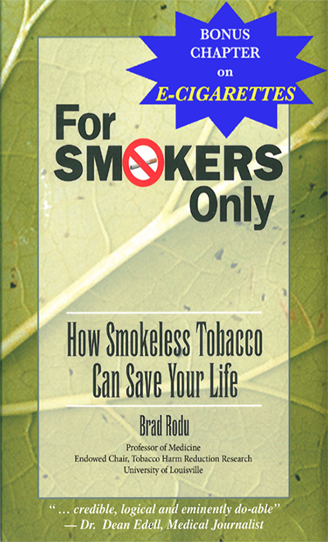Anti-tobacco extremists say that safer tobacco products aren’t necessary because FDA-approved medicines are effective. They ignore scientific evidence of those medicines’ paltry success rate (pharmaceutical nicotine works for only 7% of smokers), and of their significant side effects. For example, varenicline (Chantix) and bupropion (Zyban) carry FDA black-box warnings concerning depression and suicidal or self-injurious behavior.
A study published in PLoS One (here) concludes that “Varenicline shows a substantial, statistically significant increased risk of reported depression and suicidal/self-injurious behavior. Bupropion for smoking cessation had smaller increased risks.” The study’s first author is Thomas Moore from the Institute for Safe Medication Practices; his coauthors are from medical schools at Wake Forest, Harvard and Johns Hopkins Universities.
Moore et al. looked at cases of depression or suicidal/self-injurious behavior in the FDA Adverse Event Reporting System from 1998 to 2010. As a negative control for short-term medication, they compared behavioral episodes during varenicline and bupropion use to those during use of three common antibiotics. Because quitting smoking has also been associated with behavioral problems, Moore also used pharmaceutical nicotine as a “cessation” control.
Compared with antibiotic use, varenicline users were 37 times more likely to experience depression or suicidal/self-injurious behavior (odds ratio, OR = 37, confidence interval, CI = 28-49). The OR for bupropion was 13 (CI = 9-17), and the OR for nicotine was 4.3 (CI = 3.1-6.2).
Compared with nicotine (which controlled for behavioral problems due to quitting smoking), the OR for varenicline was 8.4 (CI = 6.8-10.4) and the OR for bupropion was 2.9 (CI = 2.3-3.7).
Moore also discussed other safety concerns: “While suicidal/self-injurious behavior and depression appear to be prominent side effects of varenicline, they are by no means the only safety issues. Varenicline has been associated with aggression and violence in three studies and carries a warning about this behavior. Its effect on vision, cognition, and motor control and other risks have led to its being banned for airline pilots, air controllers, military pilots and missile crews, and restricted for truck drivers. Varenicline is also associated with an increase in the risk of serious cardiovascular events. In addition, it is associated with hypersensitivity, angioedema and potentially life-threatening severe cutaneous adverse events [references omitted].”
Moore warns doctors prescribing varenicline about “…the value judgment of how to weigh the possible benefits of 52 weeks of smoking abstinence for 1 or 2 out of every 10 patients treated against the risk of less frequent adverse events such as violent and suicidal behavior that can have immediate, catastrophic and irreversible effects on self, family, and career. In the meantime, safer alternatives now exist and should be preferred.”
Unwritten is that one of those safer alternatives is smoke-free tobacco. While no tobacco product is absolutely safe, smoke-free alternatives deliver satisfying doses of nicotine, which is an important modulator of mood, well-being, and other behavioral performance measures.
Tobacco and Vapes Bill - another stitch up
16 hours ago










No comments:
Post a Comment